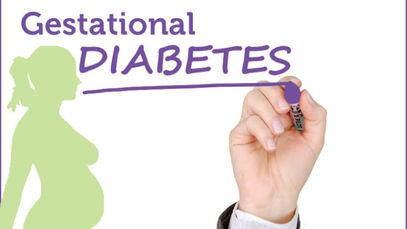Let's Celebrate..World diabetes day!!
- familygynaec
- Nov 14, 2019
- 3 min read

Today 14th November is celebrated world wide as World diabetes day to spread awareness about this fast spreading epidemic leading to suffering and complications in millions everywhere.
Today we will talk about Gestational diabetes.
Diabetes in pregnancy or high blood sugar that develops during pregnancy is also called gestational diabetes. It can happen in any stage of pregnancy but more common after 5-6 months. It usually disappears after giving birth. It can be labelled so when patients never had high sugars before pregnancy. It affects around 2-10 % of pregnancies.

Cause It happens when body cannot produce enough insulin or it cannot act properly to reduce blood sugar called insulin resistance.
Risk factors Risk factors include gestational diabetes in previous pregnancy, obesity, asian origin, family history of diabetes, previous delivery of big baby more than 4.5 kg.
Symptoms Usually diabetes in pregnancy doesn't cause any symptoms.
Testing
All pregnant woman especially in our scenario with high incidence of diabetes, should undergo a oral glucose challenge test at around 26-28 weeks of pregnancy. It is done in non fasting state, you can have breakfast and go. In this test, 75 g of glucose is given in water to drink, blood glucose checked 2 hours later. The cutoff is it should be less than 140 mg%. Anything more than the cut off means impaired glucose tolerance and needs monitoring. This is called DIPSI criteria followed in most places and recommended. Some doctors advise a fasting OGTT with measurement of fasting glucose and post glucose load one hour and 2 hour samples.The cutoffs are different.
Complications in the baby and mother
Baby may grow larger than normal, called macrosomia. Delivery of baby may be more complicated. Increase chances of C Section.
Baby is also at a risk of developing low blood glucose or hypoglycemia immediately after birth for which observation may be required.
Sudden Intrauterine death may occur in poorly controlled cases.
A condition called polyhydramnios means increase fluid around the baby can occur, which can cause preterm or early delivery.
Adult type 2 diabetes can happen later in baby.
Mother can also developt type2 diabetes later in life.
Mother with diabetes is more likely to suffer from increased blood pressure in pregnancy called preclampsia.
Treatment Risks to mother and baby can be reduced if it is detected early and managed well.
Treatment includes mainly diet control. No sweets, sugar, jaggery, few fruits, icecream, chocolates etc. Eat healthy. More proteins, whole grains and vegetables.
Moderate exercise like walking or pelvic exercises. Any new exercise or gym should not be vigorously started in pregnancy. Start gradually.
A medicine called metformin may be started by your doctor if sugars not contolled by diet alone.
Insulin may be added if sugars are still high, by a diabetologist.
Routine other oral medicines used for diabetes in non pregnant state are not safe to use in pregnancy.
Close follow up and monitoring of sugars as advised by doctor is essential to prevent complications.
Follow up care Post delivery testing is usually done 6 weeks after birth or early in few cases as advised by doctor. It should be checked 6 monthly later.
Pregnancy in a already diabetic mother is more complicated with risks of abnormalities in baby and much more and is not the scope of this article.
Disclaimer : These are the views of a qualified doctor and author. These are general suggestions and do not replace actual check up with a doctor. Any resemblance to anybody is coincidental.
Author information : Dr Harita N. Kothia, Obstetrician and Gynecologist, Mumbai.
contact on - 8169031979
e mail @ yourfamilygynaec@gmail.com



Comments